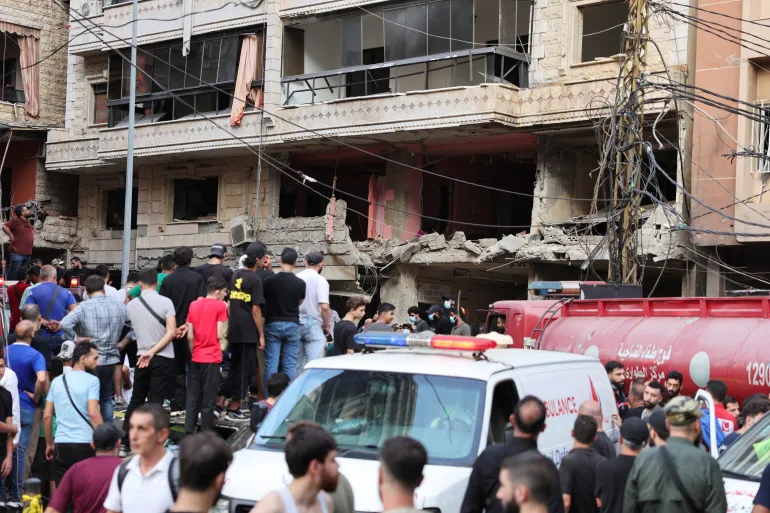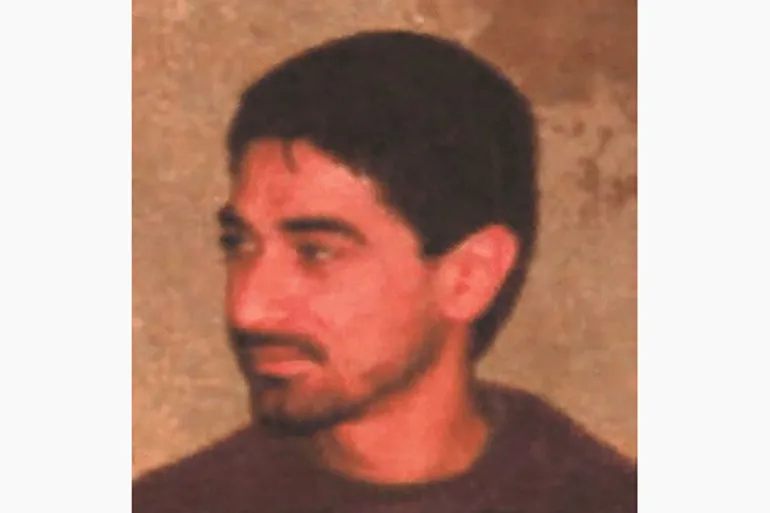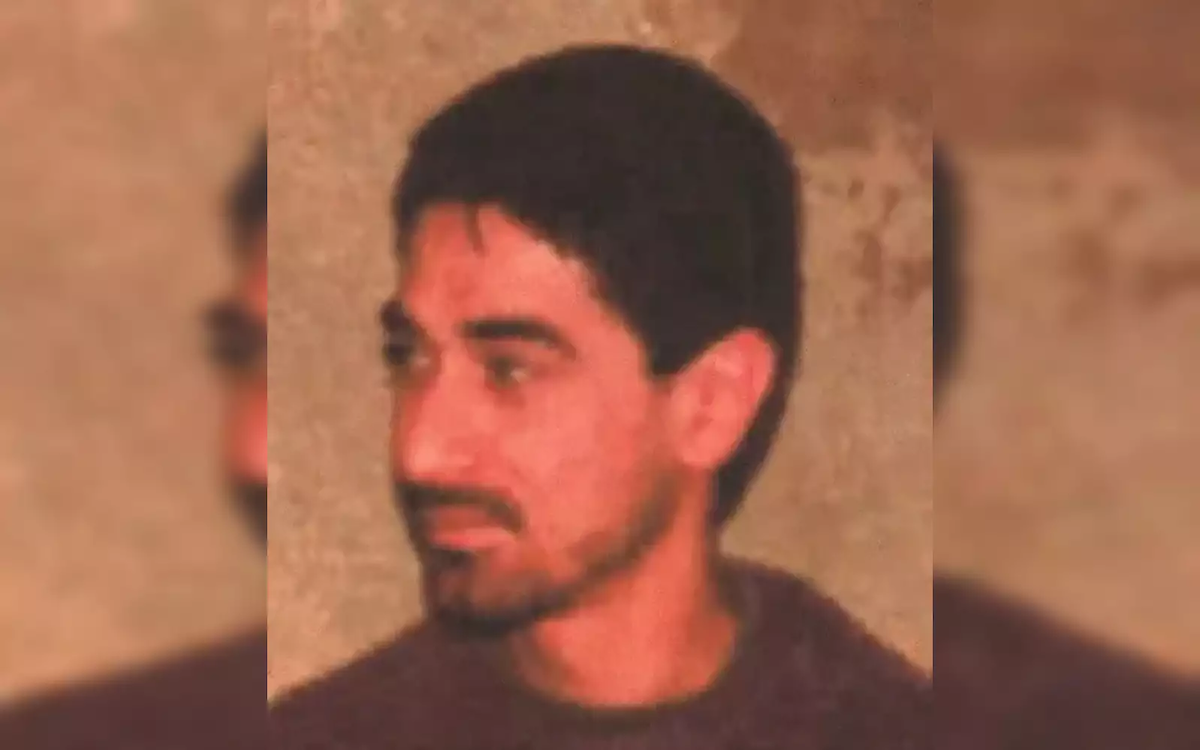Israel has launched an air raid targeting a domestic area in the southern cities of Lebanon’s capital, Beirut, in an tried assassination of elderly Hezbollah commander Ibrahim Aqil. The strike on the Dahiyeh area redounded in the deaths of at least 14 people and left 66 others wounded, according to Lebanon’s Ministry of Public Health.
Hezbollah verified Aqil’s death on Friday, hours after the Israeli service claimed responsibility for the attack, stating it had “ excluded ” him. Aqil, a elderly leader in Hezbollah’s elite Radwan Force, had a$ 7 million bounty on his head from the US Department of State. Reports indicate he was in a common meeting with members of an unnamed Palestinian group when the air raid leveled at least two structures.
Witness footage from the scene revealed piles of slate debris where one of the structures formerly stood. Thick dust blanketed situated buses as Lebanese Civil Defence forces worked lifelessly to detect survivors. The destruction and loss of life have left the area’s residers in shock, with numerous questioning the raising violence in the region.
This attack marks a significant escalation in pressures between Israel and Hezbollah. It’s the alternate time in lower than two months that Israel has targeted a leading Hezbollah military commander in Beirut. In July, an Israeli airstrike killed Fuad Shukr, Hezbollah’s top service commander. The death of Aqil, who was reportedly the alternate- in- command of Hezbollah’s fortified forces, delivers another critical blow to the association.
Ibrahim Aqil, also known as Tahsin, was a shadowy figure within Hezbollah, much like other elderly military officers in the group. Aqil joined Hezbollah in the 1980s and played a vital part in its operations outside Lebanon. According to the Israeli service, he was responsible for coordinating attacks beyond Lebanese borders. He also served on Hezbollah’s loftiest military body and was intertwined in several high- profile incidents that shaped the group’s character on the global stage.

US officers purport that Aqil was involved in the 1983 bombings of the US Embassy in Beirut, which claimed the lives of 63 people, and the bombing of the US Marine Corps barracks, which killed 241 American labor force. Both attacks were claimed by the Islamic Jihad Organization, a Hezbollah cell in which Aqil was a elderly member. He was also indicted of orchestrating the hijacking of American and German internees during the 1980s, further cementing his notoriety in the eyes of Western intelligence agencies.
The Radwan Force, in which Aqil held a elderly leadership position, has been at the van of Hezbollah’scross-border competitions with Israel. This elite unit has long been a crucial element of Hezbollah’s service strategy, particularly in its engagements with Israeli forces. Aqil’s death is anticipated to disrupt the unit’s operations and could impact the broader dynamics of the group’s service conditioning.
The timing of Aqil’s death is notable, as it comes just days after Hezbollah suffered another unknown incident. before this week, explosions involving pagers and walkie- pictures used by its members redounded in the deaths of 37 people and injuries to thousands more. Aqil himself was injured during these explosions and had only been discharged from the sanitarium before on Friday, according to Israeli review Haaretz.
This recent series of events underscores the adding vulnerability of Hezbollah’s leadership and structure. The targeted killings of high- ranking commanders, combined with the internal security breaches instanced by the pager explosions, have exposed significant challenges for the association. Judges suggest that these developments could weaken Hezbollah’s functional capabilities and dwindle its influence in the region.
The air raid on Dahiyeh has also raised enterprises about the broader counteraccusations for Lebanon’s stability. The densely peopled southern cities of Beirut, frequently appertained to as Hezbollah’s fort, have been a focal point of pressure in the country. The destruction caused by the attack has left numerous residers displaced, adding to the being profitable and social pressures faced by Lebanon.
Israel’s strategy of targeting Hezbollah’s leadership reflects its ongoing sweats to neutralize perceived pitfalls along its northern border. The Israeli service has constantly emphasized its commitment to precluding Hezbollah from expanding its military capabilities. still, these conduct have also drawn review from transnational spectators, who advise of the eventuality for farther escalation and indigenous insecurity.
In response to Aqil’s death, Hezbollah is anticipated to avenge, as the group has historically pledged to retaliate the killings of its elderly commanders. Such a response could take the form ofcross-border attacks or other measures aimed at undermining Israel’s security. This cycle of violence has fueled enterprises about a broader conflict erupting between the two sides, with ruinous consequences for the region.
The transnational community has called for restraint from both Israel and Hezbollah to avoid farther escalation. Diplomats and policymakers emphasize the significance of dialogue and conflict resolution to address the underpinning issues driving the violence. still, the deep- seated jaundice and contending interests on both sides present significant obstacles to achieving a lasting resolution.
Hezbollah’s leadership, while weakened by the loss of crucial numbers like Aqil, remains a redoubtable force in Lebanon and the broader Middle East. The group’s adaptability and rigidity have allowed it to rainfall multitudinous challenges over the times. nonetheless, the recent attacks punctuate the growing pressures it faces from both external adversaries and internal vulnerabilities.

For Lebanon, the counteraccusations of these developments are profound. The country is formerly scuffling with a severe profitable extremity, political insecurity, and social uneasiness. The destruction caused by the air raid adds to the philanthropic challenges faced by its population, numerous of whom are floundering to pierce introductory musts. The Lebanese government’s capability to respond effectively to these heads will be critical in determining the country’s future line.
The death of Ibrahim Aqil marks a significant moment in the ongoing conflict between Israel and Hezbollah. It underscores the high stakes involved in the power struggle between the two sides and the broader geopolitical dynamics shaping the region. As the situation continues to unfold, the eventuality for farther violence remains a pressing concern, with counteraccusations that extend far beyond Lebanon’s borders.
In the fate of Aqil’s assassination, both Israel and Hezbollah are likely to reassess their strategies and precedences. For Israel, the focus will remain on fighting perceived pitfalls and securing its public security. For Hezbollah, the challenge lies in maintaining its cohesion and functional effectiveness in the face of mounting pressures.
The transnational community’s part in interceding this conflict will be pivotal in precluding farther escalation. sweats to promote dialogue andde-escalation must address not only the immediate triggers of violence but also the underpinning issues driving the conflict. Achieving lasting peace in the region will bear a combined trouble from all stakeholders, including indigenous powers and transnational associations.
As the dust settles in Dahiyeh, the mortal risk of the air raid serves as a stark memorial of the ruinous impact of conflict on mercenary populations. The loss of life, relegation, and destruction emphasize the critical need for results that prioritize the well- being and security of all those affected. While the road to peace may be fraught with challenges, the pursuit of stability and concurrence remains an essential thing for the region and the world at large.




